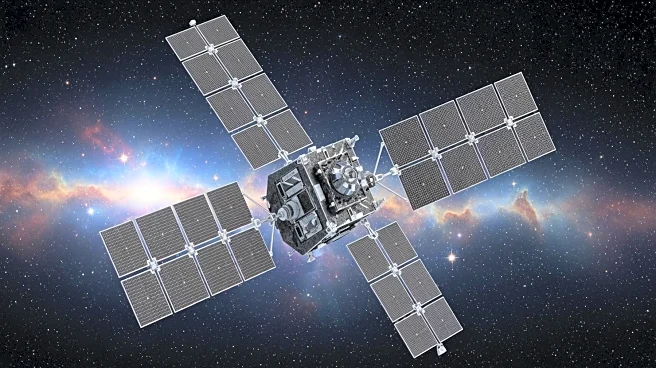What's Happening?
The European Space Agency's (ESA) PLATO spacecraft, designed to hunt for Earth-like exoplanets, has successfully deployed its twin solar panels during engineering tests. These panels are crucial for powering
the Planetary Transits and Oscillations of Stars mission, which aims to search for new worlds beyond our solar system. The deployment tests were conducted in a clean lab in the Netherlands, simulating a weightless environment to ensure the panels function correctly in space. The mission, valued at 4 billion Euros ($4.62 billion USD), is scheduled for launch in December aboard an Arianespace Ariane 6 rocket. The spacecraft will use 26 cameras to observe over 150,000 stars, detecting slight dimming caused by exoplanets passing in front of their parent stars.
Why It's Important?
The successful deployment of PLATO's solar panels marks a significant milestone in the mission's preparation, ensuring the spacecraft is ready for its ambitious task of finding Earth-like exoplanets. This mission could expand our understanding of the universe by identifying potentially habitable planets outside our solar system. The technological advancements and scientific discoveries from PLATO could influence future space exploration strategies and international collaborations in astronomy. The mission's success could also bolster ESA's reputation and capabilities in space exploration, potentially leading to increased funding and support for similar projects.
What's Next?
Following the successful panel deployment, PLATO will undergo prelaunch testing, including simulations of rocket liftoff conditions and exposure to a vacuum chamber to mimic space environments. These tests are crucial to ensure the spacecraft's resilience and functionality during its mission. Once launched, PLATO will begin its long-term observation of stars, aiming to identify exoplanets that could resemble Earth. The data collected will be analyzed to determine the characteristics of these planets, potentially leading to groundbreaking discoveries in the field of exoplanet research.
Beyond the Headlines
The PLATO mission highlights the growing interest and investment in space exploration, particularly in the search for habitable planets. It underscores the importance of international cooperation in advancing scientific knowledge and technological capabilities. The mission also raises ethical and philosophical questions about the implications of discovering life beyond Earth, challenging our understanding of humanity's place in the universe.








